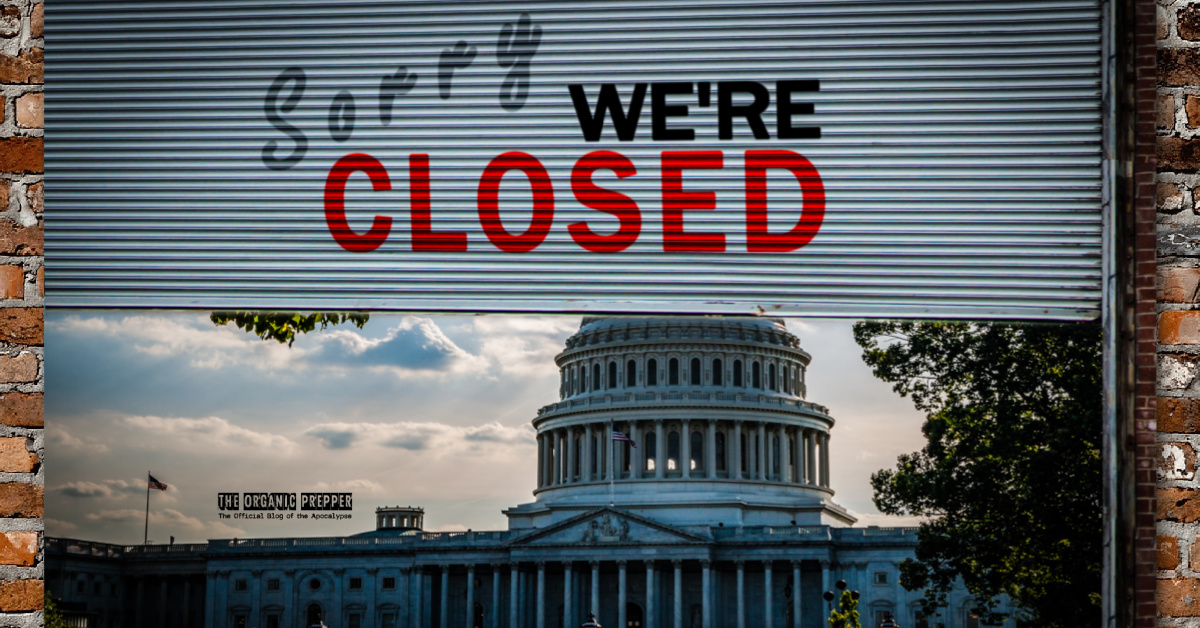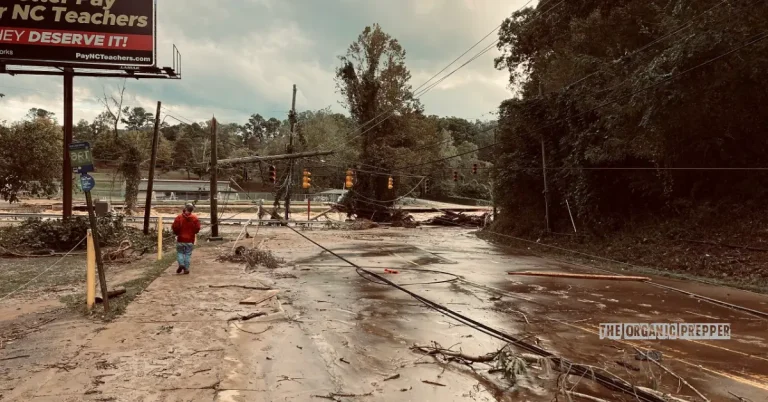(Psst: The FTC wants me to remind you that this website contains affiliate links. That means if you make a purchase from a link you click on, I might receive a small commission. This does not increase the price you’ll pay for that item nor does it decrease the awesomeness of the item. ~ Daisy)
Author of What to Eat When You’re Broke and Bloom Where You’re Planted online course
Another year, another looming government shutdown.
While part of me says, “Hey, don’t threaten ME with a good time,” the nicer part is concerned for the Americans who will be affected by this.
For example, essential government workers will still be on the job, but without pay. And in this economy, who on earth can afford that?
Anyway, this is really out of our hands, like so much lately. It’s all down to the folks who are tasked with “representing” us in Washington, DC. They’ve reached a short-term stopgap that funds the government through the month of October and half of November (and offers 6 billion dollars to Ukraine), but the threat is far from over.
Here’s who would be affected by a government shutdown.
Here, as per Reuters, is what and who would be affected should Congress not come to an agreement by November 17th.
- As for the question on everyone’s mind, the US government will still pay the salaries of thousands…of Ukrainians.
- Two million members of the military will remain at their posts, but 800,000 civilian employees of the military would be furloughed. But that’s not all. Defense contracts awarded prior to the shutdown will continue. The Pentagon can keep placing new orders. But new contracts not directly related to national security would not be awarded and payments to contractors like RTX (formerly Ratheon), Boeing, and Lockheed Martin could be delayed.
- Federal law enforcement agencies like the FBI and the DEA would remain at work, as would employees of federal prisons. Criminal federal prosecutions would continue (Sorry, President Trump) but civil federal litigations would be paused.
- Border Patrol officers, Secret Service agents, customs officers, and members of the Coast Guard can expect to keep working. Folks who work for the FTC would most likely be furloughed.
- Federal courts and the Supreme Court can remain open for a few more weeks.
- Unsurprisingly, members of Congress will continue to get paid, though their staff will not. Despite the missing paychecks, staffers will be required to still come to work.
- Airport security screeners and air traffic control workers would be required to work but may not be paid. Training for new air traffic controllers would be halted.
- Embassies and consulates will continue to operate and passports and visas will continue to be processed (at least until they run out of money).
- Reuters says it’s unclear whether national parks will remain open or not. Wildfire fighting will continue.
- The Smithsonian and National Zoo would close.
- Research would be halted at the National Institutes of Health, the National Science Foundation, and the National Oceanographic and Atmospheric Administration (NOAA) as most of their workers would be furloughed.
- NASA will continue to support the International Space Station, but other work would cease as about 17,000 of its 18,300 employees would be furloughed.
- About half of the employees of the CDC would be furloughed, though the organization would continue to monitor disease outbreaks.
- The VA would continue to provide healthcare for veterans.
- Health care for Native Americans would continue.
- Inspections for hazardous waste sites, drinking water facilities, and chemical facilities would cease, as would food safety inspections by the FDA.
- The SEC would furlough 90% of its employees and the CFTC would furlough nearly everyone.
- As an important reminder that these organizations are NOT part of the government but instead privately funded by the industries they “regulate,” The Federal Reserve, the Federal Deposit Insurance Corporation (FDIC), and the Office of the Comptroller of the Currency would continue operations as normal.
- Retirement and disability payments through the Social Security Administration would continue.
- Military veteran’s payments will continue.
- Food assistance such as SNAP and WIC would be discontinued. SNAP has enough money for October, but WIC would cease immediately. (But who cares about hungry kids? At least our members of Congress will get paid, right?)
- Sadly, the IRS will operate as normal.
- FEMA will run out of money SOON, particularly if an emergency strikes during the shutdown.
- Pell Grants and students loans will initially be doled out, but a lengthy shutdown could “severely curtail” aid to schools and universities. Funds due later in the year could be delayed.
- The Army Corps of Engineers would continue to operate as normal.
- Head Start programs for children from low-income families would cease.
- The Small Business Association wouldn’t be processing new loans.
- Meat and egg inspections would continue, but labs would be shut down. Crop insurance would continue, but rural development, loan programs, research efforts, and conservation efforts would be shut down.
- Inspections of workplace safety would be limited and unfair pay practice investigations would cease.
- The US Postal Service would operate as normal.
According to Reuters, the President would face some inconvenience but would still be paid.
In the 2018-2019 shutdown, the White House furloughed 1,100 of 1,800 staff in the Executive Office of the President. Some offices, such as the National Security Council, continued at full strength, while others like the Office of Management and Budget (OMB) were scaled back sharply.
White House furloughs could make it harder to comply with the impeachment investigation of President Joe Biden, a Democrat, by Republicans in the House of Representatives.
The U.S. Constitution specifies that the president continues to get paid.
And there you have it: the government shutdown in a nutshell.
As usual, the people who will really suffer are the ones who are struggling the most already and everyday people just trying to earn a paycheck. Those who have money and power will continue to have money and power. The theater of it is to make average people suffer to prove how much we “need” the government.
The stop-gap funding gives you about six weeks to prepare for any disruptions you may personally face.
What are your thoughts? Will you or anyone you know be affected by the shutdown if it happens? Do you have a contingency plan for it? How long do you predict a shutdown would last this time around?
Let’s discuss it in the comments section.
About Daisy
Daisy Luther is a coffee-swigging, adventure-seeking, globe-trotting blogger. She is the founder and publisher of three websites. 1) The Organic Prepper, which is about current events, preparedness, self-reliance, and the pursuit of liberty; 2) The Frugalite, a website with thrifty tips and solutions to help people get a handle on their personal finances without feeling deprived; and 3) PreppersDailyNews.com, an aggregate site where you can find links to all the most important news for those who wish to be prepared. Her work is widely republished across alternative media and she has appeared in many interviews.
Daisy is the best-selling author of 5 traditionally published books, 12 self-published books, and runs a small digital publishing company with PDF guides, printables, and courses at SelfRelianceand Survival.com You can find her on Facebook, Pinterest, Gab, MeWe, Parler, Instagram, and Twitter.
















